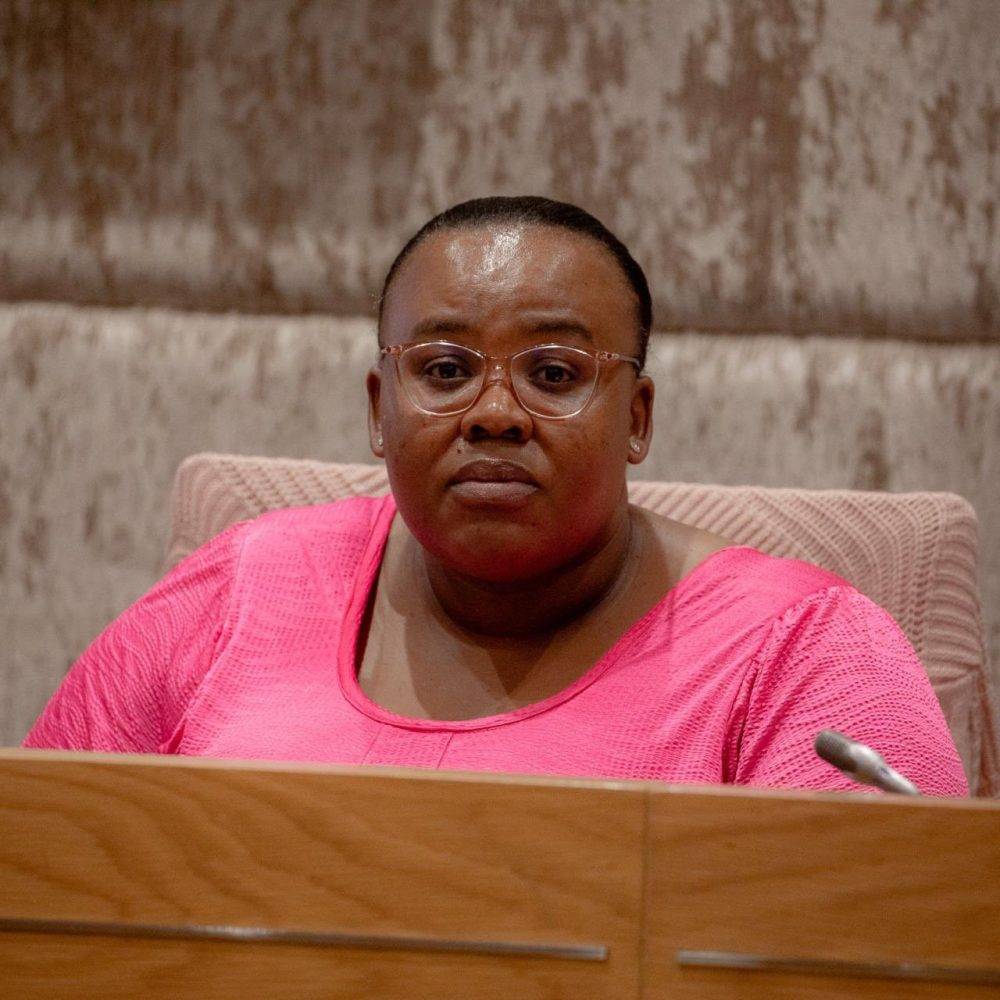
Chairperson of the portfolio committee on correctional services, Anthea Ramolobeng. (File photo)
South African prisons had an overcrowding rate of 48% in the 2023/2024 financial year, housing 156 000 inmates but only having approved bed spaces for 105 474, correctional services portfolio committee chairperson Anthea Ramolobeng said on Tuesday.
She also expressed “shock” at the number of foreign nationals who were inmates in the country’s prisons, saying that by the end of March 2024 “the department incarcerated 22,612 foreign national inmates, 690 of whom are serving life sentences”.
The department spends R500 per day per offender in its correctional facilities, she said.
Ramolobeng made the statements while speaking to media as part of parliament’s weekly committee cluster programme – in this case the peace and security cluster, and how oversight was to be strengthened.
A number of issues contributed to overcrowding, she said, including inmates who were unable to afford bail.
“We saw this at the Colesberg Correctional Centre [during an oversight visit] where there were a number of inmates who [could not afford bail of R1000 or less].”
Remand detainees being held without the option of bail also contributed to overcrowding, as did Section 63A applications due to the nature of the crime committed, previous criminal records, and the involvement in gangs and criminal syndicates.
There were also state patients who should be in mental health institutions but instead were in prisons, she said. The committee was engaging with the department of health and the portfolio committee on health on this issue.
Overcrowding was also exacerbated by “the huge number of foreign nationals in our facilities”.
Ramolobeng said that in October last year, the committee undertook an oversight visit in Gauteng, where it found that at Emthonjeni Youth Correctional Centre in Baviaanspoort, of the 525 juvenile offenders, 400 were foreign nationals.
“The committee also found 2 912 foreign national inmates in Modderbee Correctional Centre, while in Kgosi Mampuru Correctional Centre, there were 2 394 foreign nationals, and in Johannesburg Correctional Centre there were 4 079 foreign national inmates,” she said.
She said that to address overcrowding, the department was implementing an “eight point strategy”, which included:
– Managing the levels of awaiting trial detainees through the integrated case management task team and the intersectoral committee on child justice.
– Managing the levels of sentenced offenders by improving the use of community corrections, supervision, release on parole, and transferring inmates between correctional centres to “establish some kind of evenness” of overcrowding.
– Encouraging debate on incarceration as a sentence and encouraging appropriate sentences that focus more on rehabilitation, self-sufficiency and offender labour.
– Implementing the self-sufficient and sustainable framework to increase work opportunities for offenders and equip them with market-related skills as part of their rehabilitation.
– Using offender labour for day-to-day maintenance and renovation of correctional facilities, reducing reliance on the department of public works.
– Engaging with the department of health to address the issue of mental health patients being incarcerated in correctional facilities instead of being in mental health institutions.
– Addressing the issue of foreign nationals in correctional facilities, which was a “dire concern” for the department.
Contraband
Ramolobeng said that contraband flooding into correctional centres remained a serious concern, “particularly as the number of investigations and the number of officials disciplined did not correlate one another with the amount of contraband found in each management area or in facilities”.
For instance, she said, in the Johannesburg management area, 1393 cellphones were found between July and September 2024, but only 48 formal disciplinary cases were registered, 84 investigations conducted, and 25 suspensions implemented.
“In Kgosi Mampuru II, 1 700 cellphones were found between April and September, while in Leeuwkop, 63 cellphones were found between May and July.”
The committee would be conducting an “unannounced” oversight visit in KwaZulu-Natal between February 24 and 28, she said, adding that she would not disclose which facilities would be visited, so that no “preparation” could take place.
The committee was “putting our foot down” in 2025, she said, and would ensure accountability.